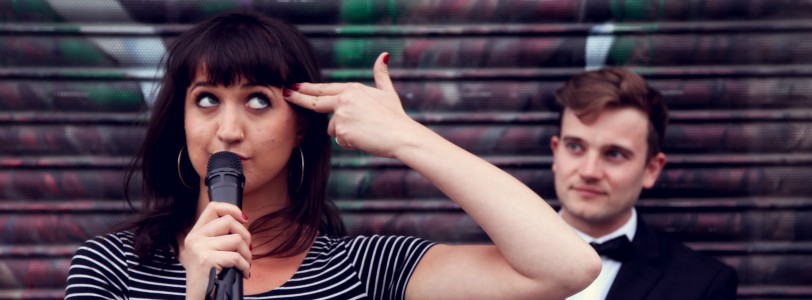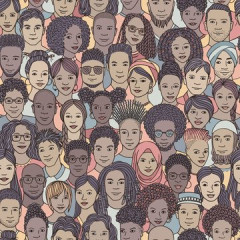Could you first introduce yourself to the reader?
My name is Ellen Waddell, and I am the co-writer, co-director and co-producer of Don’t be Terrible.
How would you describe your show?
It’s a pitch-black comedy play that asks ‘can stand up save your love life?’ and it straddles the thin and meta line between stand up and play. Our main character, self-confessed nice guy Steve, thinks comedy can salvage his relationship. That's why he's asked Alice, an up-and-coming stand-up, how to make people laugh. It's his last-ditch attempt to distract his girlfriend from the funny guy at work. Unfortunately, Alice believes in comedy much more than she believes in love, and is not the guru he was expecting. It was co-written with Oliver Milburn, and was on at the Free Fringe in 2018, and has now been transferred to the Pleasance Courtyard.
Why do you want to perform at Edinburgh Festival Fringe?
This year I am not performing! I have performed solo shows in the past, and although I loved doing them I thought it would be nice to write a play instead and hire actors to do the heavy lifting (and they are terribly good).
What differentiates it from other festivals?
The camaraderie. I haven’t experienced any one-upmanship at the Fringe and it feels as though all the performers are incredibly honest about what a challenge it can be. No one pretends it’s easy, and no one pretends they are completely sane for wanting to do it. And everyone has the best and worst month of their lives.
What first motivated you to enter the industry? Who were your inspirations?
Storytelling has always been my way of making sense of the world, so it made sense to go into writing and performing. I wanted to find a space where I could articulate all my difficult and weird feelings and have other people nod and go ‘yeah, I’ve felt like that.’ My main inspiration is Mike Birbiglia, an American comedian, who is the king of comedic storytelling. I have studied his shows and joke structure in too much detail, and attempted to lovingly emulate it.
If you didn’t have your current job, what would you probably be doing?
I am a big comic book fan, so probably attempting to weasel my way into that world.
If you could have any job in the world, what would it be?
This. Being a writer. But full time and earning enough to keep me in kinder eggs and white wine spritzers.
What is your earliest childhood art memory?
Probably getting to the final of the Butlins’ talent contest performing the White Cliffs of Dover. I pulled out though, as I didn’t really want to win the prize of another holiday at Butlins.
Do you ever feel any pressure to be a social commentator, or constantly update material to respond to events?
Not at all. I think it’s always best to write material on what interests you, and if that happens to align with the current political climate or allow you to comment on society, then fabulous. ‘Don’t be Terrible,’ contains a lot of my stand up and although most of it is exceptionally self-indulgent and funneled through my own experiences of the world, it does touch upon sexism and gender politics. And it does have central messages about how men and women are expected to behave in society, and what happens if you are not ‘man’ enough or ‘feminine’ enough. But that’s only because that is what interested myself and my co-writer.
Equally, do you think there has been a shift in public sentiment that has affected your work?
I think #metoo has made it a lot easier to talk about sexism and power abuse and how common place it is, without turning audiences off or making them instantly recoil. They are more willing to listen to what you have to say, because it’s no longer a taboo or edgy subject, and there is more space to have that conversation. It also mean’s comedians have to be warier about making lazy sexist jokes.
Describe the last year in 5 words or less?
There’s been lots of admin.
If you could work with anybody, from any point in history, who would you pick and why?
I am going to have to opt for Mike Birbiglia (I don’t know if it’s obvious but I am a huge fan). I would love to work with him, although I have no idea what I would contribute but maybe I could hand him tea, and attempt to offer quips and punch ups.
Why would a performer opt to do either a ticketed event or participate in the free fringe? What are the benefits and limitations of both?
It’s very difficult for your show to be noticed in the sea of thousands of shows, and ticketed can make it easier to get people to take a chance on your work, due to the reputation that comes with the venue you are performing in. Also, reviewers are probably more likely to pop their head in. But you can still get a full house for a Free Fringe show, if you flyer hard. But to be honest the most important thing is having a solid piece of work that stands out. As no matter where you are word of mouth is always one of your strongest allies.
What advice would you give to someone who wants to take a show up to the fringe?
Have no expectations other than learning how to be a better performer, and make sure you don’t compare yourself to anyone else. This is your journey. Also eat veggie haggis. It’s really nice.
When and where can people see your show?
11pm at Bunker One, in the Pleasance Courtyard.
And where can people find, follow and like you online?
@dontbeterrible on twitter and instagram!
Don’t Be Terrible - Pleasance Courtyard, Bunker One, 11pm, 31st July – 25th August (not 12th)
Tickets: https://tickets.edfringe.com/whats-on/don-t-be-terrible









0 Comments